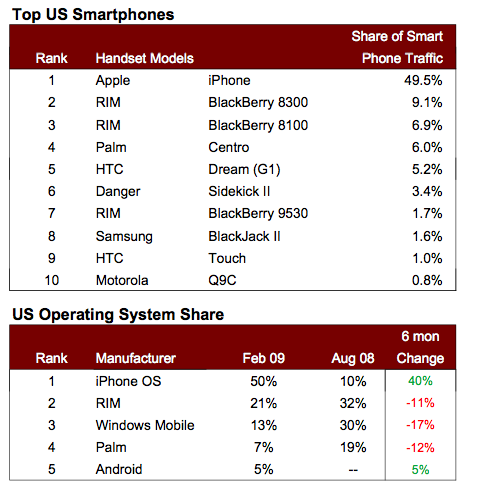iPhone dominates in mobile Web traffic, Android already on its way up

Some interesting mobile Web traffic numbers were released today from AdMob Mobile Metrics that put the Apple iPhone way ahead of the other smartphones. How far, you ask? Well, let's just say that the iPhone is totally dominating with almost 50 percent of mobile Web traffic from smartphones in the U.S.
That's quite a lead.
AdMob bases this data from the 1,000 apps and 6,000 publishers that use AdMob to track their traffic. Although it may be skewed somewhat, the numbers come from a relatively large sample, gathering data from more than 7 million iPhones.
So, who are our runner-ups? In second place is the RIM BlackBerry 8300 (Curve) with 9.1 percent of mobile Web traffic, third place is another RIM BlackBerry, the 8100 (Pearl), with 6.9 percent, and in fourth is the Palm Centro with 6 percent of mobile Web traffic.
In August 2008, the iPhone made up just 10 percent of mobile Web traffic, meaning it has skyrocketed to its almost 50 percent mark in just six months. BlackBerry's traffic had decreased from 32 percent to 21 percent, and Windows Mobile declined from 30 percent to 13 percent. Ouch.
All this is based on U.S. numbers, but worldwide, smartphones running on the Symbian OS are still holding the majority of the share. The Symbian OS has mostly Nokia phones and holds 43 percent of mobile Web traffic. That might sound like a lot, but it's actually down from 64 percent in August. Guess who's responsible for the decline? Yep, it's the iPhone, whose numbers went from 4 percent in August to 33 percent on a worldwide basis.
Could this drastic change in mobile Web traffic be due to the fact that the Apple iPhone is one of the only phones with full browsing capabilities and a plethora of Web apps? That being said, there's one other phone rising from the ashes of those with declining numbers. The Android has gained a 5 percent share only three months after it was launched. Both the Android and the iPhone share similar features, which may be why their numbers are going up, and the others are going down.
Where will the numbers go from here? Will the iPhone continue to rise, holding a monopoly over the other smartphones? Or will RIM and Android join the iPhone in the VIP room?
[Via TechCrunch]
